How I drank urine and bat blood to survive
- Published
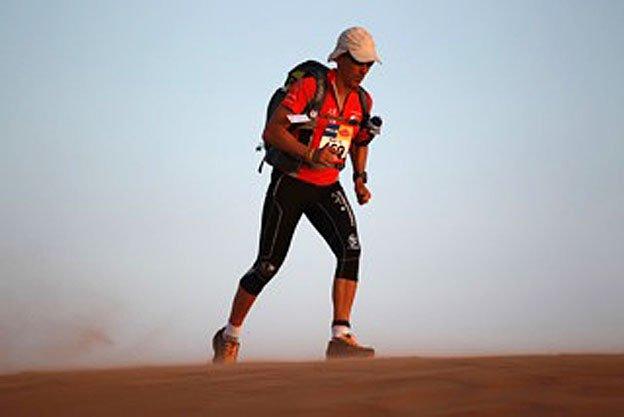
Mauro Prosperi was 39 years old when he took part in the 1994 Marathon des Sables - a six-day, 250km (155-mile) race through the Sahara described as the toughest race of its kind. Following a sandstorm, the former Olympic pentathlete was lost in the desert for 10 days. Here he tells his story.
What I like most about running extreme marathons is the fact that you come into close contact with nature - the races take place in beautiful settings such as mountains, deserts, glaciers. As a professional athlete I hadn't been able to enjoy these surroundings because I was so focused on winning medals.
I found out about the Marathon des Sables by chance. I had already retired from the pentathlon when a good friend said to me: "There's this amazing marathon in the desert - but it's very tough." I love a challenge so I started training immediately, running 40km (25 miles) a day, reducing the amount of water I was drinking to get used to dehydration. I was never home.
My wife, Cinzia, thought I was insane - the race is so risky that you have to sign a form to say where you want your body to be sent in case you die. We had three children under the age of eight, so she was worried. I tried to reassure her. "The worst that can happen is that I get a bit sunburned," I said.
When I arrived in Morocco, I discovered a marvellous thing - the desert. I was bewitched.
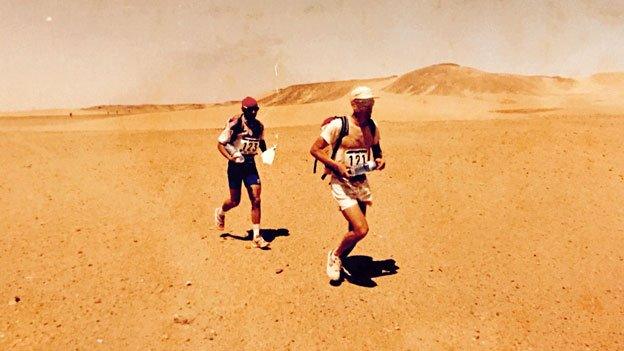
Prosperi runs with fellow Italian Mario Malerba in the 1994 Marathon des Sables
These days the Marathon des Sables is a very different experience, with up to 1,300 participants it's like a giant snake - you couldn't get lost if you tried. But back in 1994 there were only 80 of us, and very few who were actually running, so most of the time I was on my own.
I was always the first Italian to reach the next stage and I'd put up a flag on my tent so that we could all get together in the evenings. It was fun.
Things went wrong on the fourth day, during the longest and most difficult stage of the race.
When we set out that morning there was already quite a bit of wind. I had passed through four checkpoints when I entered an area of sand dunes. I was alone - the pacemakers had gone ahead.
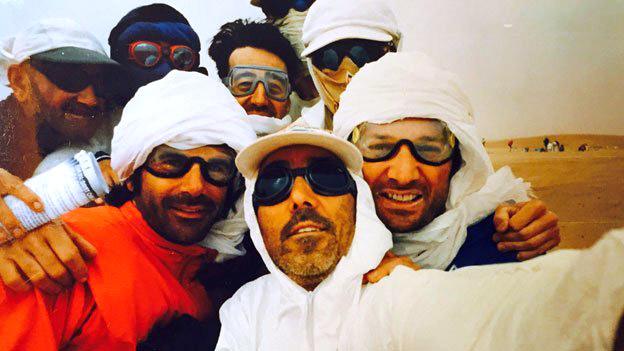
The camaraderie of desert running
Suddenly a very violent sandstorm began. The wind kicked in with a terrifying fury. I was swallowed by a yellow wall of sand. I was blinded, I couldn't breathe. The sand whipped my face - it was like a storm of needles. I understood for the first time how powerful a sandstorm could be. I turned my back on the wind and wrapped a scarf around my face to stop the sand from wounding me. I wasn't disoriented, but I had to keep moving to keep from getting buried. Eventually I crouched down in a sheltered spot, waiting for the storm to end.
It lasted eight hours. When the wind died down it was dark, so I slept out on the dunes. I was upset about the race because, until then, I had been in fourth place. I thought: "Oh well, I can't win now but I can still make good time. Tomorrow morning I'll get up really early and try to reach the finish." You have 36 hours to run that stage of the race - any longer and you are disqualified - so there was still a chance. What I couldn't have imagined was how dramatically that storm would change everything around me.
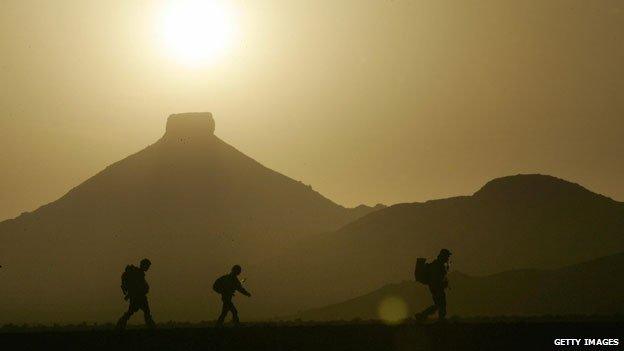
Marathon des Sables competitors battle a sandstorm in 2006
I woke up very early to a transformed landscape. I didn't know I was lost. I had a compass and a map so I thought I could navigate perfectly well, but without points of reference it's a lot more complicated.
I wasn't worried because I was sure that sooner or later I'd meet someone. "Who knows how many others are in the same situation?" I thought. "As soon as I see someone we can team up and get to the finish together." That was my plan, but unfortunately it didn't work out.
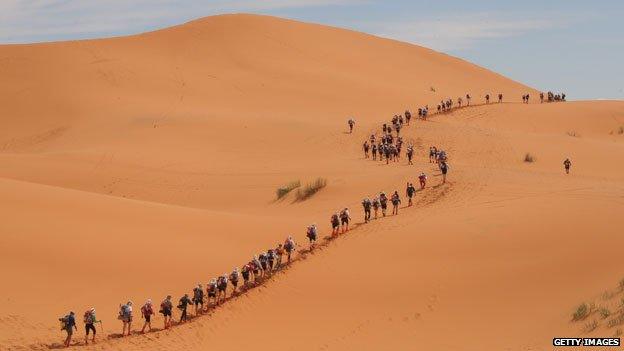
Marathon des Sables runners snake across the sands in 2009 - it attracts more than 1000 people a year
After running for about four hours I climbed up a dune and still couldn't see anything. That's when I knew I had a big problem. I started to walk - what was the point of running? Running where?
When I realised I was lost, the first thing I did was to urinate in my spare water bottle, because when you're still well-hydrated your urine is the clearest and the most drinkable. I remembered my grandfather telling me how, during the war, he and his fellow soldiers had drunk their own urine when their water ran out. I did it as a precaution, but I wasn't desperate. I was sure the organisers would find me soon.
When running the Marathon des Sables you have to be self-sufficient, and I was well-prepared: I had a knife, a compass, sleeping bag and plenty of dehydrated food in my backpack. The problem was water. We were given fresh water at the checkpoints, but when the storm hit I only had half a bottle of water left. I drank it as slowly as I could.
I'm very resistant to heat and I was very careful. I would only walk when it was cool, early in the morning and then again in the evening. During the day, when I wasn't walking, I'd try to find shelter and shade. I was wearing two hats - a baseball cap with a red woollen hat on top - to keep the temperature as constant as possible. Luckily my skin is quite dark so I didn't really suffer from sunburn.
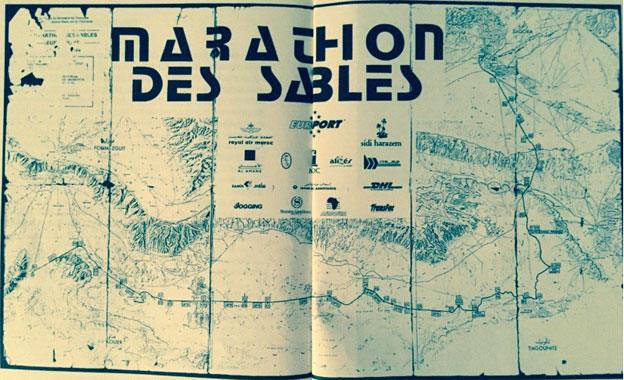
Prosperi's map of the 1994 Marathon des Sables
On the second day, at sunset, I heard the sound of a helicopter coming towards me. I assumed it was looking for me so I took out my flare and shot it in the air, but he didn't see it. It was flying so low that I could see the pilot's helmet, but he didn't see me - he flew right past.
The helicopter, on loan from the Moroccan police, was returning to base to refuel. Since 1995, because of my experience, runners have been equipped with the kind of flares they use at sea - which they're not happy about, because they weigh 500g - but at the time the flares we had were really small, no bigger than a pen.
Nevertheless I remained calm, because I was convinced the organisers would have the resources to find anyone lost in the desert. I still thought I would be rescued sooner or later.
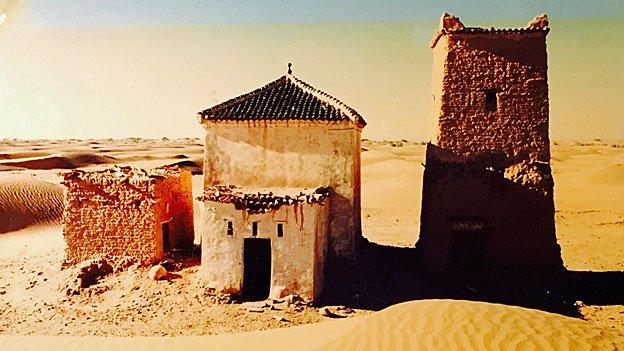
The holy man's tomb that almost became Prosperi's tomb
After a couple of days I came across a marabout - a Muslim shrine - where Bedouins stop when they are crossing the desert. I was hoping it was inhabited, but unfortunately there was nobody there - only a holy man in a coffin. But at least I had a roof over my head, it was like being home. I assessed my situation: it wasn't rosy, but I was feeling all right physically. I ate some of my rations, which I cooked with fresh urine, not the bottled urine that I was saving to drink - I started to drink that on the fourth day.
The marabout had filled up with sand from all the sandstorms, so the ceiling was very low. I went up to the roof to plant my Italian flag, in the hope that anybody looking for me could see it. While I was up there I saw some bats, huddled together in the tower. I decided to drink their blood. I grabbed a handful of bats, cut their heads and mushed up their insides with a knife, then sucked them out. I ate at least 20 of them, raw - I only did what they do to their prey.
I stayed in the marabout for a few days, waiting to be found.
I gave in to despair only twice. Once was when I saw the helicopter and it didn't see me. The other time was when I saw the aeroplane.
I had been in the marabout for three days when I heard the sound of a motor - an aeroplane. I don't know if it was looking for me, but I immediately started a fire with whatever I had - my rucksack, everything - in the hope the plane would see the smoke. But just then another sandstorm hit. It lasted for 12 hours. The aeroplane didn't spot me.
I felt it was my very last chance to be found. I was very depressed. I was convinced I was going to die and that it was going to be a long agonising death, so I wanted to accelerate it. I thought if I died out in the desert no-one would find me, and my wife wouldn't get the police pension - in Italy, if someone goes missing you have to wait 10 years before they can be declared dead. At least if I died in this Muslim shrine they would find my body, and my wife would have an income.
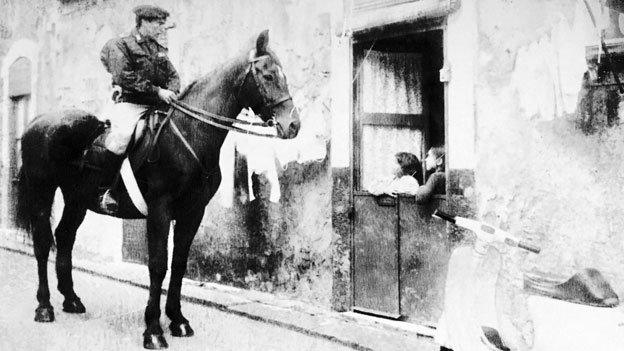
Prosperi worked for the mounted police in Sicily
I wasn't afraid of dying and my decision to take my own life came out of logical reasoning rather than despair. I wrote a note to my wife with a piece of charcoal and then cut my wrists. I lay down and waited to die, but my blood had thickened and wouldn't drain.
The following morning I woke up. I hadn't managed to kill myself. Death didn't want me yet.
I took it as a sign. I regained confidence and I decided to see it as a new competition against myself. I became determined and focused again. I was thinking of my children. I put myself in order - Mauro the athlete was back. I needed to have a plan. I still had quite a lot of energy left, I wasn't tired. As a former pentathlete I was used to training 12 hours a day and I had trained well for the Marathon des Sables so I didn't feel too weak. I still had some energy tablets, too.
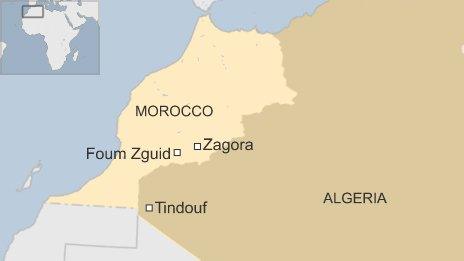
Prosperi started near Foum Zguid and was found in Tindouf 300km from the finishing line in Zagora
I regained my strength and mental lucidity. I decided to get out of the shrine and start walking again, but where to? I followed the advice the Tuareg had given us all before we started the race: "If you're lost, head for the clouds that you can see on the horizon at dawn, that's where you will find life. During the day they will disappear but set your compass and carry on in that direction." So I decided to head for those mythical clouds on the horizon.
I walked in the desert for days, killing snakes and lizards and eating them raw - that way I drank, too. I think there are some instincts, a kind of deja vu, that kick in in an emergency situation: my inner caveman emerged.
I was aware that I was losing an incredible amount of weight - the more I walked, the looser my watch felt on my wrist. I was so dehydrated I couldn't urinate anymore. Luckily I had some anti-diarrhoea medicine which I kept taking.

Surviving in the desert
Without water, death occurs after about three days in the desert as the body dries out quickly - at sea people can survive six to seven days
Drink nothing for the first 24 hours to put your body into survival mode
Drinking urine is not recommended, it contains salt and urea so will actually dehydrate you further - seawater is even worse
Digesting protein uses more water than other foods so is best avoided
Drinking blood may help as it is easy to digest and may conserve body water - survivors at sea have drunk turtle blood
Source: The Essentials of Sea Survival by F Golden and M Tipton (2002)

I wanted to see my family and friends again and I concentrated on that. I wasn't afraid. At the same time, I started to view the desert as a place where people can live. I could see the beauty of the desert. I paid careful attention to every trace - even dried excrement gave me clues about what direction to go in.
I learned that there is food all around you, if you learn to look. As I was walking through the desert I recognised dried riverbeds where succulents grew, so I squeezed their juice out and drank that.
I started to think of myself as a man of the desert. Later, a Tuareg prince dedicated a poem to me - according to him I was a "chosen one" because I survived for so long in the desert.
Meanwhile, the organisers were out looking for me. My brother and brother-in-law had flown in from Italy to join the search. They found some of the traces I had left behind, like my shoelaces. They got to the marabout and found signs of me. But they were sure they were looking for a body.
On the eighth day I came across a little oasis. I lay down and drank, sipping slowly, for about six or seven hours. I saw a footprint in the sand, so I knew people couldn't be far.
The next day, I saw some goats in the distance - it gave me hope.

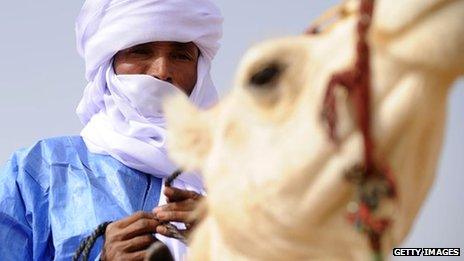
The song of the Tuareg
Singing springs under the palms of the green oasis, listen to the call of the Tuareg in the night, in the calm/ At the pace of my pale camel I go, I travel without destination/ The desert is a world, a land of thirst and hunger/ The immense dunes stretch out, like an ocean of misfortune, from the waves of stirring sands.
Excerpt from a poem dedicated to Mauro Prosperi by a Tuareg prince

Then I saw a young shepherd girl. She saw me too and ran away, scared. After nine days in the desert I must have looked quite a sight, I was black with dirt. The girl ran towards a large Berber tent to warn the women I was coming. There were no men in the camp - they had gone to market - but the women took care of me. They were so kind. An older woman came out of the tent and immediately gave me some goat's milk to drink. She tried to give me some food as well, but I threw it up. They wouldn't allow me into the tent because I was a man, but they put me on a carpet in the shade of their veranda. Then they sent someone to call the police - they like to camp close to military bases for protection.

A visibly thin Prosperi returns to a hero's welcome in Italy
The police came and carried me to their Jeep. They took me to their military base, blindfolded, because they didn't know who I was. They thought I might be dangerous. They had guns and I thought at times that they were going to kill me. When they found out I was the marathon runner who had got lost in Morocco they took off my blindfold and celebrated. I discovered that I had crossed the border into Algeria. I was 291km (181 miles) off course.
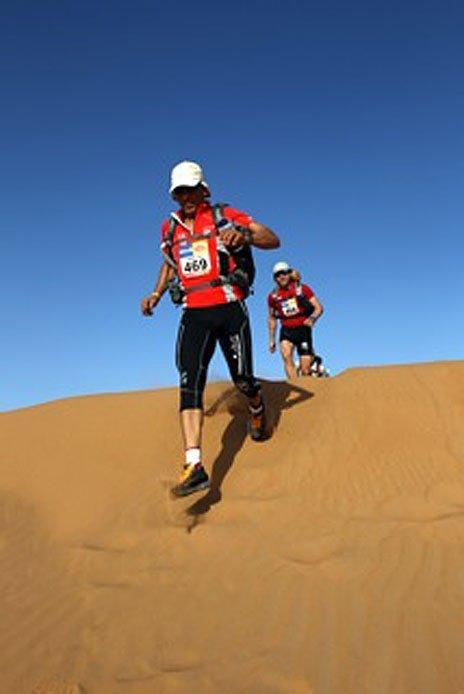
Prosperi has run the Marathon des Sables seven times: in 2001 he came 12th
They took me to hospital in Tindouf, where finally, after 10 days, I was able to call my wife. The first thing I said to her was: "Have you already had my funeral?" Because after 10 days lost in the desert you would expect someone to be dead.
When they weighed me in the hospital I had lost 16kg (35lb) - I weighed just 45kg (99lb). My eyes had suffered and my liver was damaged, but my kidneys were fine. I couldn't eat anything other than soup or liquids for months. It took me almost two years to recover.
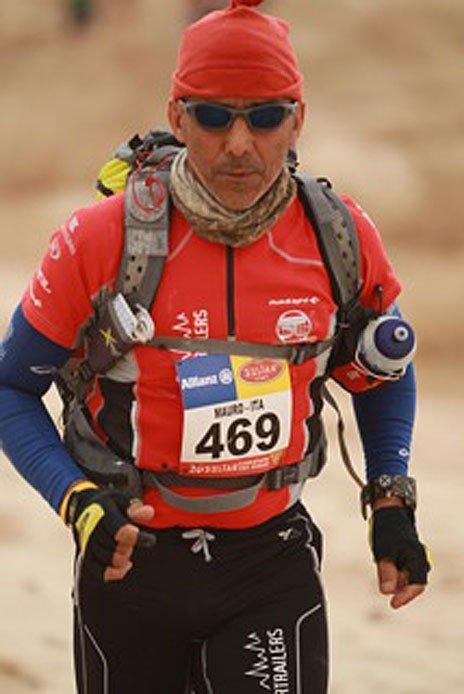
Prosperi plans to run a 7000km race across the Sahara next year
Four years later I was back at the Marathon des Sables. People ask me why I went back, but when I start something I want to finish it. The other reason was that I can't live without the desert. Desert fever does exist, and it's a disease that I've absolutely caught. I'm drawn back to the desert every year to greet it, to experience it.
I ran eight more desert marathons and am now preparing for my biggest yet. Next year I'm planning to run 7,000km (4,350 miles) coast-to-coast, external across the Sahara from Agadir (Morocco) on the Atlantic Ocean to Hurghada (Egypt) on the Red Sea. Sport and nature are part of my life, and these races allow me to experience them first-hand.
My wife was a saint. She coped with me for many years but at a certain point, because of my lifestyle, we decided to split up. We are still best friends, maybe more so now than when we were married. I have a new partner but she knows I am a man on a mission. I can't change.
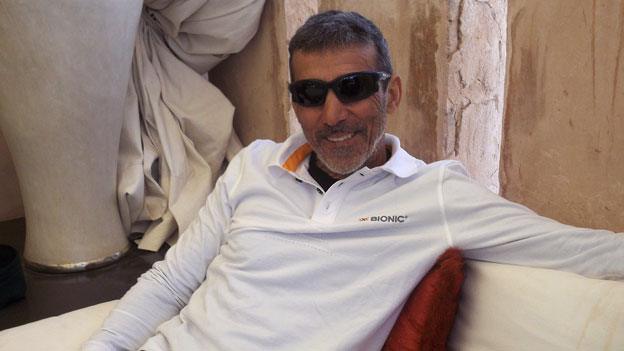
Mauro Prosperi spoke to Outlook on the BBC World Service. Listen to the interview again on iPlayer or get the Outlook podcast.
Photographs courtesy of Mauro Prosperi
Subscribe to the BBC News Magazine's email newsletter to get articles sent to your inbox.